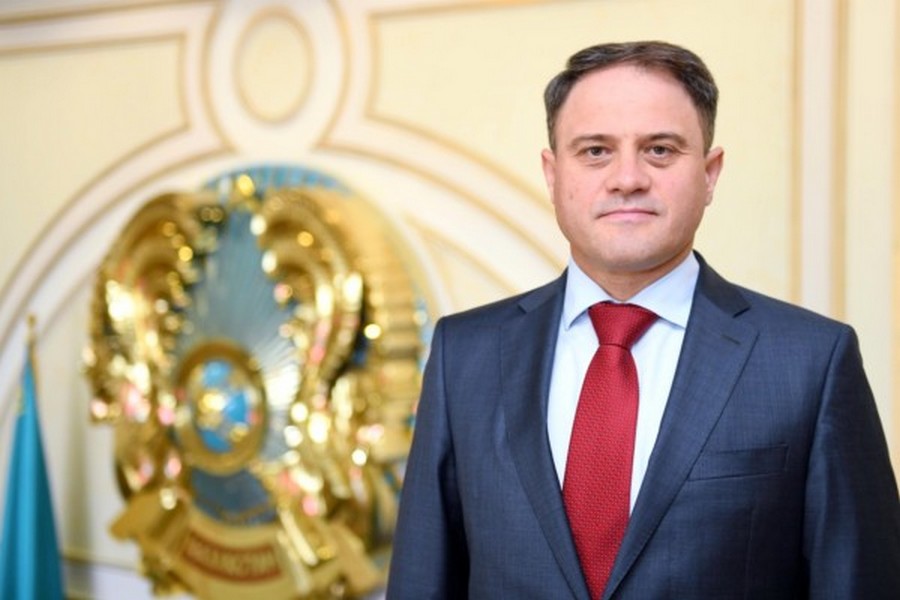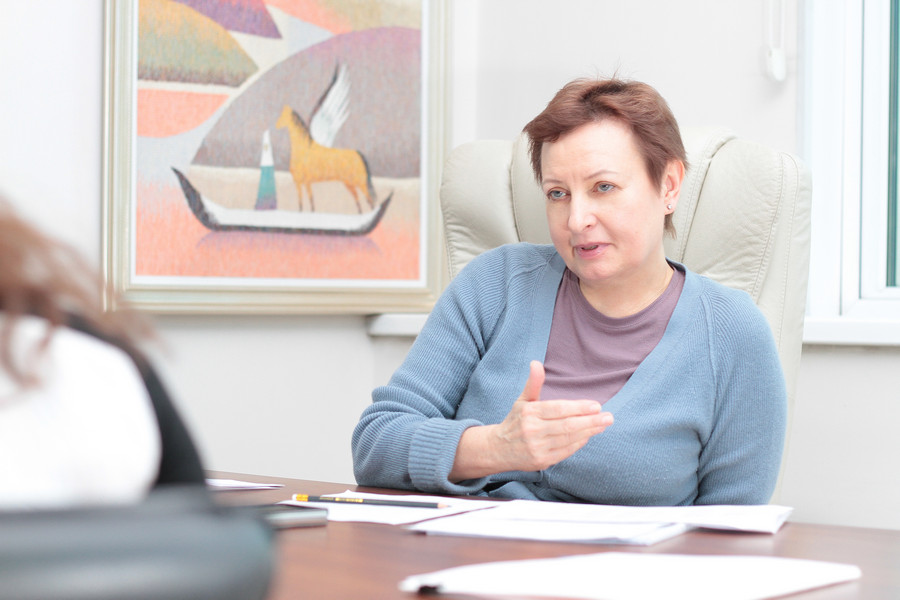Deputy Foreign Minister Roman VASILENKO:
KAZAKHSTAN ATTACHES GREAT IMPORTANCE TO THE DEVELOPMENT OF CONSTRUCTIVE DIALOGUE IN THE EU - CENTRAL ASIA FORMAT

The European Union adopted a new strategy for cooperation with Central Asia. The document is aimed at strengthening relations between the sides and deepening interaction in a number of areas, promoting sustainability and prosperity of the countries of the region. Deputy Foreign Minister Roman VASILENKO talked in an interview with Interfax-Kazakhstan on Kazakhstan’s participation in the devising of the new EU document, as well as the expectations of our country from the implementation of the strategy.
- Roman Yuryevich, tell [us] about the EU strategy for Central Asia - when was the first document adopted and what areas did the strategy cover?
- The European Union’s First Strategy for Central Asia was adopted in May 2007. This is a program document regulating the main areas of the EU cooperation with our region. The strategy is implemented through relevant regional and bilateral programs funded as part of the EU’s 7-year budget cycles. The budget for the current period - 2014-2020 – amounts nearly to 1.1 billion Euros.
To maximize the effective and broad use of limited financial resources instead of allocating grants for expensive infrastructure development projects herewith the EU seeks to support relatively low-cost projects that have significant practical benefits.
The EU grant assistance in Central Asia targets the following areas: regional sustainable development, regional security, agricultural development, health development, educational development, including within the framework of the Erasmus + education program and the rule of law.
We actively participate in the regional programs, for example, Kazakhstan is the leader in the region in terms of participation in the Erasmus + education program.
In addition to the Development Cooperation Instrument (DCI), which is the main [program] the EU financial support for Central Asia is also provided in the form of loans from the European Bank for Reconstruction and Development (EBRD) and the European Investment Bank (EIB), which have already invested nearly 11 billion Euros in the region.
Among other things loans from the EBRD and the EIB support projects to improve municipal water supply and sewage systems, build solar and wind power plants, finance the expansion of SMEs, as well as develop transport and energy infrastructure.
The third option features a "mix" of grant assistance and borrowed funds.
In addition, the Central Asian countries have the opportunity to participate in the global EU development programs bringing together the countries from various regions on a thematic basis.
For our part, we welcome cooperation in the EU-Central Asia format and consider it one of the additional tools that contribute to the sustainable development of Kazakhstan and our region as a whole.
- For how long is the new EU strategy for Central Asia intended? Did Kazakhstan participate in the preparation of this document and whether our country voiced any proposals?
- The new EU strategy for Central Asia lays the foundations for cooperation in the EU-Central Asia format for the next 10-15 years and the adoption of the Strategy is only the first step in this aspect.
Kazakhstan, being an active supporter of advancing cooperation with the EU in a regional format, attaches special importance to the new EU Strategy for Central Asia.
We conveyed our vision of the new Strategy to the European side in which we sought to take into consideration both the interests of our country and the entire region. Accordingly, we suggested focusing on the development of private entrepreneurship, small and medium-sized businesses, transport and logistics infrastructure in the Central Asian countries and in addition, on energy efficiency, environmental protection, combat against climate change and the rational use of water resources, as well as education.
At the same time, we proposed to focus on digitalization and strengthening the potential of female entrepreneurship.
I am convinced that aspirations to deepen cooperation with the EU in these areas are common to all the countries of our region.
- Which of these proposals were taken into account by the European Union?
- The authors of the document note that in the course of drafting they made sure all the proposals of the Kazakh side were included in the Strategy.
Indeed, this document is simultaneously the fairly clear-cut, truly strategic vision of EU priorities in relations with our region and contains many specific aspects, goals and mechanisms for their achievement. Herewith our proposals regarding the strategy fleshing out, its practical implementation, as well as enhancing its visibility are reflected in the document.
- What areas will the document cover and which areas will a special focus be made on?
- As it is known, the new EU Strategy are Sustainability and Prosperity topics are two main aspects, which actually possess a tantamount importance degree for Kazakhstan.
Within the Sustainability topic framework the EU plans to intensify cooperation in overcoming external and internal challenges, as well as in fulfilling reforms. In particular, the EU intends to intensify political dialogue of the Central Asian countries with each other and with Europe, to strengthen cooperation in the fields of security, combating terrorism, drug trafficking and countering current threats. In the context of broad security, the EU will do its utmost to back the efforts of the Central Asian countries to stabilize the situation in Afghanistan.
Cooperation in the fields of environmental protection, renewable energy, energy efficiency and water management will also be the important elements of the Strategy.
The Prosperity topic envisages assistance with economic reforms, the intensification of mutual trade of the Central Asian countries with each other and Europe, intensification of dialogue among the business communities, support for private entrepreneurship, assistance with the accession of the Central Asian countries to the WTO, strengthening and development of the interconnectedness of the Central Asian region with Europe, as well as comprehensive cooperation in the field of education and culture.
- In your opinion, how interested are the Central Asian countries in this document, whether will its implementation be effective?
- Currently the countries of our region as never before are interested in developing cooperation in the European Union - Central Asia format. To this end we expect that the new Strategy will give a powerful impetus to our interaction and serve as the beginning of closer and coordinated cooperation aimed at achieving concrete practical results to the benefit of our countries and regions.
We are fully committed to working with our Central Asian neighbors and the European Union to achieve these goals.
Now relations in Central Asia are experiencing a new “dawn”. Regular meetings of the leaders of the countries of the region in bilateral and multilateral formats support the increased dynamics of interaction. In turn, this opens up new prospects for interaction between the European Union and our region.
The key elements impacting the successful implementation of the Strategy are the tools and mechanisms for its implementation, in particular, development programs.
Therefore, the next important step is the implementation of the new Strategy. We have a unique opportunity to rethink the experience gained over many years, join forces and focus on increasing the practical impact of the implementation of the new EU program document.
- What are Kazakhstan’s expectations from the new EU strategy?
- We attach great importance to the development of constructive dialogue in the European Union - Central Asia format. Currently the European Union is our reliable partner interested in the politically stable, economically sustainable and safe development of all the countries of the region.
Kazakhstan fully supports inter-regional cooperation with the European Union and considers it one of the additional tools for the sustainable development of our country and the region as a whole.
Kazakhstan, being an active supporter for advancing cooperation with the EU in a regional format, attaches priority importance to cooperation within the framework of the new EU Strategy for Central Asia.
The raised review of the main aspects of the new Strategy of the European Union for Central Asia is quite impressive. We highly appreciate the positive agenda of the new EU program document and its paramount mindedness towards strengthening existing cooperation between our regions, as well as the use of new opportunities as a result of the positive dynamics in the relations among the Central Asian countries.
- How do you assess the prospects for cooperation of the Central Asian countries, in particular Kazakhstan, with the European Union?
- The European Union is one of the key partners for Kazakhstan.
Last year, we marked a remarkable anniversary - the 25th anniversary of the establishment of diplomatic relations.
Over this short period of time by historical standards, and especially, in recent years we have managed to do a lot to strengthen and expand multidisciplinary cooperation.
Our political dialogue is characterized by openness, meaningfulness and high dynamics, the absence of unresolved problems and the coincidence of positions on the global and regional agenda.
We became first among the Central Asian countries to reach the level of enhanced partnership with the EU; we created effective structures for bilateral interaction.
The European Union continues to be our largest trade and investment partner.
The EU accounts for 50.6% of foreign trade turnover and 48% of accumulated foreign capital in the Kazakh economy. The trade turnover reached $ 37 billion in 2018 or up 23% from 2017 and it amounted to 40.3% of Kazakhstan's total foreign trade.
The gross inflow of direct investments from the European Union amounted to $ 11.6 billion in 2018 or up 18.4% from 2017.
Over the years of independence the gross inflow of foreign direct investments in the country's economy has amounted to $ 300 billion and Kazakhstan accounts for more than 75% of the [EU] investment in the Central Asia countries. We believe that, in general, this trend will be maintained.
For the purpose of further improving the investment climate and perfecting work on attracting investments, the Coordination Council on the Issues of Attracting Investments has been established under the chairmanship of Kazakhstan’s Prime Minister, who also personally performs duties of an investment ombudsman.
For the purpose of successfully promoting Kazakh products exports to the EU markets, systematic work is being carried out to ensure national products compliance with the OECD and EU countries’ high standards.
Currently one can highlight a number of vital areas of cooperation that are of key importance to bilateral relations between Kazakhstan and the EU. These are agriculture, innovation, finance, education, energy, environmental protection, green technology, security and transport.
- Thank you for the interview!
June, 2019
© 2025 Interfax-Kazakhstan news agency
Copying and use of these materials without reference to the source is prohibited
Archive






